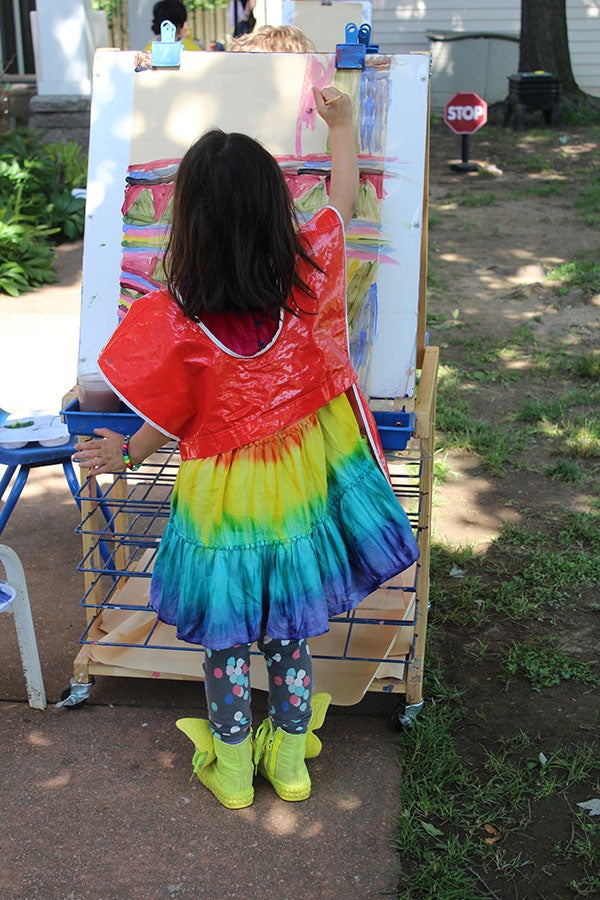Center for Young Children (CYC)
About Us

Philosophy
The Center for Young Children is dedicated to providing an exemplary early childhood program and committed to fostering the continued growth and development of each child on a cognitive, physical, emotional, and social level. Since children learn best through active involvement, the CYC provides an enriched, stimulating, and safe environment that encourages exploration and experimentation. Children are guided to question, hypothesize, solve problems, and express themselves creatively. Teachers at the CYC respect and understand the uniqueness of each child.
Assurance of Excellence
The Center for Young Children has achieved national accreditation by the National Association for the Education of Young Children. This organization recognizes outstanding early childhood programs which meet and exceed national standards of quality.
The Center is licensed by the division of Early Childhood Development within the Maryland State Department of Education. The kindergarten program is state certified and in compliance with the standards for such programs in public institutions.
Statement of Inclusion
At the Center for Young Children, we are committed to the inclusion of all children and their families in our high quality early childhood environment. We believe that inclusion is a right, and therefore we foster social, emotional, cognitive, and physical development in a safe and supportive community. Our general and special education teachers provide curriculum and experiences that actively engage children to emphasize individual growth. We value partnerships with families and outside service providers so that, through a team approach, we ensure that each child meets their full potential. We welcome a diverse community for the benefit of all children at the CYC.
Professional Development
In keeping with the CYC's mission, undergraduate students in UMCP's early childhood special education program are placed at the school for various practicum experiences. Their ongoing presence is an acknowledgement of the CYC's strong teacher training component.
Additionally, faculty at the CYC are involved in many professional development activities off campus. The CYC also hosts institutes and workshops for both its own faculty and other area professionals.
Assessment
The CYC uses The Work Sampling System developed by Samuel Meisels. The components are performance assessment, developmental guidelines and checklists, portfolio collection and summary reports. The Work Sampling System is based on seven domains of learning. The seven domains are Personal and Social, Language and Literacy, Mathematical Thinking, Scientific Thinking, Social Studies, and The Arts.
- The structure of the CYC curriculum accommodates the performance assessment aspect of Work Sampling. The teachers are experts at taking anecdotal notes during the children’s work time, meeting times and everyday activities such as outdoor play and meal time. These notes are used to identify strengths and weaknesses in individual children as well as informing the teacher of trends in the group as a whole. Therefore, this information is used to inform instruction for the individual and the group.
- With the use of digital technology, an important aspect of performance assessment is the photography that demonstrates children’s learning, interests and abilities. Teachers collect hundreds of images for each child. The images are organized according to the learning domains mentioned above. This documentation work then becomes digital portfolios that are comprehensive and in-depth and addresses the development of the whole child.
- Families are provided summary reports and digital portfolios of children’s growth and development. These reports are also organized by domain and contain specific examples of children’s growth as evidenced by the anecdotal and digital documentation that is collected.
History
The Center for Young Children traces its origins to the University of Maryland Kindergarten established in 1948 by Edna Belle McNaughton. In 1965, an expanded nursery-kindergarten program moved to the new College of Education building. The Center followed the academic University calendar, training student teachers and conducting research to understand how children learn and develop. In September 1993, the University opened a new facility located near Elkton Hall to continue and expand the mission of the Center.
2008 Marked the 60th anniversary of the Center for Young Children. To commemorate this event Director Dr. Favretto, and Assistant Director Anne Daniel researched the history and commissioned four large panels to be created for display at the Center. Follow this link to view the History Panels (14 MB).